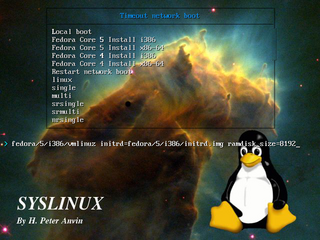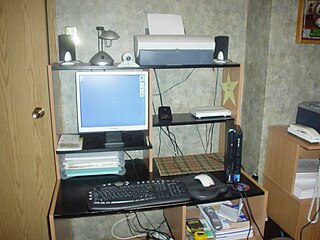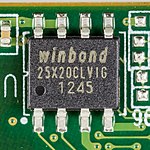Related Research Articles

KNOPPIX is an operating system based on Debian designed to be run directly from a CD / DVD or a USB flash drive, one of the first live operating system distributions. Knoppix was developed by, and named after, Linux consultant Klaus Knopper. When starting a program, it is loaded from the removable medium and decompressed into a RAM drive. The decompression is transparent and on-the-fly.
A boot disk is a removable digital data storage medium from which a computer can load and run (boot) an operating system or utility program. The computer must have a built-in program which will load and execute a program from a boot disk meeting certain standards.

A live CD is a complete bootable computer installation including operating system which runs directly from a CD-ROM or similar storage device into a computer's memory, rather than loading from a hard disk drive. A live CD allows users to run an operating system for any purpose without installing it or making any changes to the computer's configuration. Live CDs can run on a computer without secondary storage, such as a hard disk drive, or with a corrupted hard disk drive or file system, allowing data recovery.

The Syslinux Project is a suite of five different boot loaders for starting up Linux distros on computers. It was primarily developed by H. Peter Anvin.

Damn Small Linux (DSL) is a discontinued computer operating system for the x86 family of personal computers. It is free and open-source software under the terms of the GNU GPL and other free and open source licenses. It was designed to run graphical user interface applications on older PC hardware, for example, machines with 486 and early Pentium microprocessors and very little random-access memory (RAM). DSL is a Live CD with a size of 50 megabytes (MB). What originally began as an experiment to see how much software could fit in 50 MB eventually became a full Linux distribution. It can be installed on storage media with small capacities, like bootable business cards, USB flash drives, various memory cards, and Zip drives.

SystemRescue is a Linux distribution for x86 64 and x86 computers. The primary purpose of SystemRescue is to repair unbootable or otherwise damaged computer systems after a system crash. SystemRescue is not intended to be used as a permanent operating system. It runs from a Live CD, a USB flash drive or any type of hard drive. It was designed by a team led by François Dupoux, and is based on Arch Linux since version 6.0. Starting with version 6.0, it has systemd as its init system.

UEFI is a set of specifications written by the UEFI Forum. They define the architecture of the platform firmware used for booting and its interface for interaction with the operating system. Examples of firmware that implement these specifications are AMI Aptio, Phoenix SecureCore, TianoCore EDK II and InsydeH2O.
Puppy Linux is an operating system and family of light-weight Linux distributions that focus on ease of use and minimal memory footprint. The entire system can be run from random-access memory (RAM) with current versions generally taking up about 600 MB (64-bit), 300 MB (32-bit), allowing the boot medium to be removed after the operating system has started. Applications such as AbiWord, Gnumeric and MPlayer are included, along with a choice of lightweight web browsers and a utility for downloading other packages. The distribution was originally developed by Barry Kauler and other members of the community, until Kauler retired in 2013. The tool Woof can build a Puppy Linux distribution from the binary packages of other Linux distributions.

Linux for PlayStation 2 is a kit released by Sony Computer Entertainment in 2002 that allows the PlayStation 2 console to be used as a personal computer. It included a Linux-based operating system, a USB keyboard and mouse, a VGA adapter, a PS2 network adapter, and a 40 GB hard disk drive (HDD). An 8 MB memory card is required; it must be formatted during installation, erasing all data previously saved on it, though afterwards the remaining space may be used for savegames. It is strongly recommended that a user of Linux for PlayStation 2 have some basic knowledge of Linux before installing and using it, due to the command-line interface for installation.
Plop may refer to:

Das U-Boot is an open-source, primary boot loader used in embedded devices to package the instructions to boot the device's operating system kernel. It is available for a number of computer architectures, including 68k, ARM, Blackfin, MicroBlaze, MIPS, Nios, SuperH, PPC, RISC-V and x86.

A live USB is a portable USB-attached external data storage device containing a full operating system that can be booted from. The term is reminiscent of USB flash drives but may encompass an external hard disk drive or solid-state drive, though they may be referred to as "live HDD" and "live SSD" respectively. They are the evolutionary next step after live CDs, but with the added benefit of writable storage, allowing customizations to the booted operating system. Live USBs can be used in embedded systems for system administration, data recovery, or test driving, and can persistently save settings and install software packages on the USB device.

The EFIsystem partition or ESP is a partition on a data storage device that is used by computers having the Unified Extensible Firmware Interface (UEFI). When a computer is booted, UEFI firmware loads files stored on the ESP to start installing operating systems and various utilities.

Dreamlinux was a Brazilian computer operating system based on Debian Linux. It can boot as a live CD, from USB flash drive, or can be installed on a hard drive. The distribution's GUI aims to have a centered animated toolbar. As of October 2012, The Dreamlinux Project has been discontinued.

SliTaz GNU/Linux is a lightweight Linux distribution, community-based, suitable for use on older hardware and as a Live CD or Live USB. SliTaz stands for "Simple, Light, Incredible, Temporary Autonomous Zone" according to the boot screen.

Clonezilla is a suite of open source drive cloning, drive imaging and system deployment utilities used to simplify deployment and maintenance of a group of computers. Clonezilla Server Edition uses multicast technologies to deploy a single image file to a group of computers on a local area network. Clonezilla was designed by Steven Shiau and developed by the NCHC Free Software Labs in Taiwan.

Calculate Linux is a Linux distribution optimized for fast deployment in an organization environment. It is based on the Gentoo Linux project and includes many preconfigured functions.

MX Linux is a Linux distribution based on Debian stable and using core antiX components, with additional software created or packaged by the MX community. The development of MX Linux is a collaborative effort between the antiX and former MEPIS communities. The MX 'name' comes from the M for MEPIS and the X from antiX - an acknowledgment of their roots. The community's stated goal is to produce "a family of operating systems that are designed to combine elegant and efficient desktops with high stability and solid performance".
References
- ↑ Schroder, Carla (2011-05-13). "Weekend Project: Use the Plop Boot Manager to Boot Older Computers from USB". Linux.com . Retrieved 2022-12-12.
- ↑ Reed, Michael. "Using Plop Boot Manager for USB Boot | Linux Journal". Linux Journal . Retrieved 2022-12-12.
- ↑ Proven, Liam. "Plop Boot Manager boots PCs off media they can't start from". The Register . Retrieved 2022-12-12.
